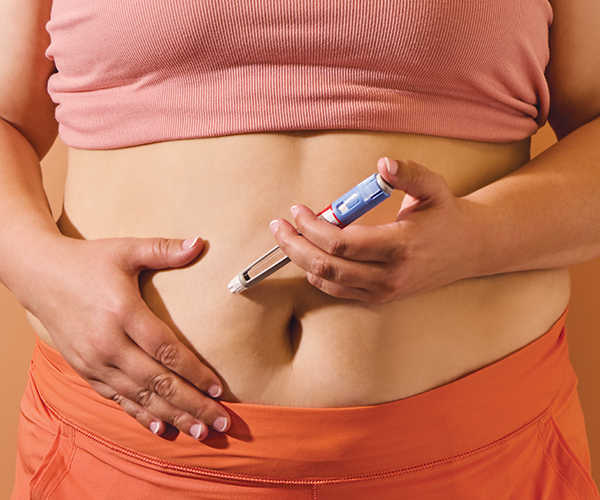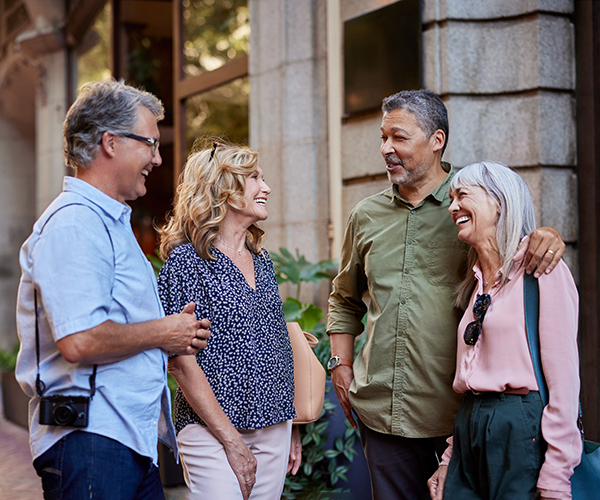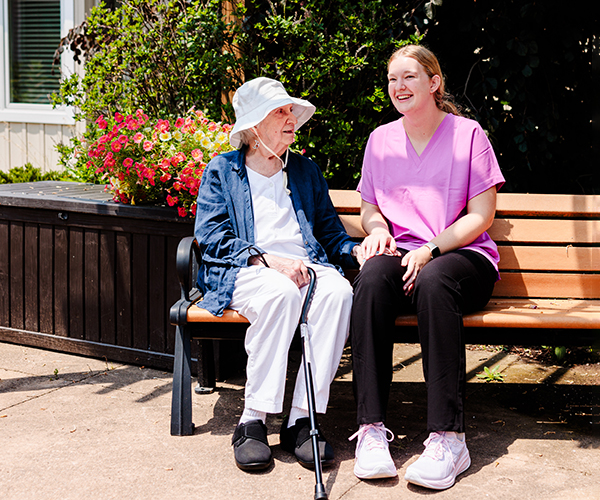Editor's Note: Scroll to the bottom of this page for a list of addiction and recovery resources.
For those struggling with addiction, social contact is a crucial element of the recovery process, from in-person Narcotics Anonymous and Alcoholics Anonymous meetings to sponsor talks, friend or family conversations and the community-building events and programming that can help those in recovery find footing within society.
Now, amidst the spread of coronavirus and Ohio’s ongoing opioid epidemic, the community is navigating a particularly perilous time, working to maintain those crucial relationships, even when clients and their support systems must remain apart.
“Isolation is the kindling of active addiction,” says Daniel Lettenberger-Klein, the executive director of Stella Maris, an addiction treatment facility in the West Bank of the Flats that’s operated for 72 years. “And we’re in a time when isolation is recommended.”
Largely built upon in-person therapy, the addiction treatment community is now relying extensively on telehealth resources, and making the transition at rapid speed. Alcoholics Anonymous Cleveland, Stella Maris and many other Northeast Ohio facilities are using video chat platforms for their weekly meetings and daily check-ins with clients and staff.
The ADAMHS Board of Cuyahoga County has shared resources from the State of Ohio for webinars that teach providers how to navigate the platforms. On its website, it’s also promoting the Connections App, a smartphone app developed by national organization Addiction Policy Forum, which allows patients in recovery to stay social through e-therapy, sobriety tracking, trained counselor and peer chat and more. Thanks to an executive order issued by Gov. Mike DeWine on March 26, these telehealth services can be expensed through Medicaid.
“We want people to know that all services are still being offered for those dealing with mental health and addictions, although the format has kind of changed,” says Scott Osiecki, CEO of the ADAHMS Board.
Prior to coronavirus, Stella Maris wasn’t implementing any telehealth services. In three days, it moved 90 clients and 40 staff members to telehealth operations, and has yet to lay any staff members off.
“Community-based behavioral health has not historically been actively involved in telehealth, especially on the ground floor with a largely at- or below-the-poverty-line population, just because they typically lack some of the resources that ensure adequate internet speed or consistent access,” says Lettenberger-Klein. “But we’ve actually been able to navigate this storm fairly well.”
That’s meant moving about 50% of Stella Maris’ staff into remote positions, as well as implementing virtual admissions processes for partial hospitalization, intensive and non-intensive outpatient care, including phone-based screening for COVID-19 symptoms before clients even step into a treatment facility. This week, the organization also added a registered nurse, who is offering virtual COVID-19 screenings and other care for clients in early recovery.
Typically, Stella Maris gets about 1,200 to 1,500 non-client visitors on its main campus a week, including those visiting its now-closed coffee shop and coming in for outpatient services such as 12-step meetings, mentoring, counseling and more. It also sees 75 intensive outpatient clients, 30-40 non-intensive clients and 15-20 partial hospitalization clients at any given time. Now, Stella Maris is completely closed to the public.
Social distancing and the shelter-in-place order has affected detox facilities and those living together in supportive housing as well. Stella Maris had to reduce its beds available for detox from 20 to 12 to ensure only one patient was in each room in the facility. (Those in search of detox services can still find beds at outlets such as St. Vincent Charity Hospital's Rosary Hall). The only patients that are able to enter Stella Maris' supportive housing, or houses available for those in the early stages of recovery, are the clients that are coming from detox, not outside the facility, to ensure Stella Maris isn’t admitting a person who is infected with the virus. Supportive housing residents are meant to have a job during this period as part of their recovery. Stella Maris has waived that requirement, as many clients lost their jobs because they were unable to leave supportive housing for fear of bringing COVID-19 back into the residences.
At Stella Maris at least, fewer people have even requested detox services during the coronavirus pandemic, which concerns Lettenberger-Klein.
“It's the first time that phones are fairly quiet in my time here, and we typically run a waitlist of between 120 to 150 people every day, and return about 40 to 60 phone calls every day for detox alone,” he says. “The phone's been pretty quiet because nearly everybody sheltering in place. And we know the drugs didn't stop. The use didn't stop. So my fear is, in the midst of this pandemic, the likelihood of higher overdose rates is, I believe, greater.”
In March, the ADAMHS Board has seen a 30% increase in the use of its 24-hour WarmLine, a pre-existing hotline that allows those struggling with mental health issues or addiction to talk to certified peer counselors who have experienced similar issues. Currently, its mobile response team, which would travel to complete assessments for patients in-person, is only doing phone assessments, since one of its members tested positive for COVID-19.
“The thing that we're gearing up for with mental health and substance abuse disorders is as this continues to go on, the crisis that we're in right now with COVID-19 — well, right now people are worried about getting toilet paper, food, their immediate needs,” says Osiecki. “When they start to settle in, more of the emotional aspects of this will happen, and so, providers will be gearing up for an increase in services as we go along.”
And friends and family members of those dealing with addiction can tend to those emotional connections too, Lettenberger-Klein notes, even from afar.
“Now, more so than ever, is a time for kindness and patience, especially for those in early recovery,” he says. “It's making that phone call you might not otherwise make. It's checking in. It's being supportive and patient and kind and being a resource. When you can text, call instead. When you can email, call instead. Do something that's a bit more personal, a bit more relational. And use your resources. Reach out to the experts, to mentors, and if there’s anything we can do, we will.”
For those seeking help with addiction and recovery during COVID-19, here are some local resources.
Alcoholics Anonymous Cleveland: Use this local branch of the national 12-step organization's website tool to find times for Zoom AA meeting, or speak to those specializing in alcohol addiction about next steps for friends or family. aacle.org/local-aa-meetings-on-zoom
ADAMHS Board of Cuyahoga County: You can find a host of resources on the ADAMHS Board website, including links to the smartphone Connections App, virtual recovery meetings and more. Reach the ADAMHS Board's 24/7 WarmLine at 440-886-5950 to speak with trained peer counselors. If you're having a mental health or addiction crisis, call the 24-hour hotline at 216-623-6888 for a referral to services or detox. adamhscc.org
Project DAWN: Part of the MetroHealth System, this opioid education program also distributes free life-saving Naloxone, an emergency medication designed to rapidly reverse the effects of an opioid overdose. Eligible participants include those who are at-risk of opioid overdose, including those who are in recovery for opioid addiction, and those who are actively using opioids, in addition to individuals who know someone who is at risk for opioid overdose. Project DAWN is currently offering services at 10 a.m. to 2 p.m., Monday through Friday, in its Project DAWN MetroHealth RV, which has moved one block north between Trowbridge Avenue and MetroHealth Drive next to the Lincoln building in Cleveland. metrohealth.org/emergency-room/opioid-education-project-dawn
Narcotics Anonymous Ohio: This Ohio branch of the national 12-step organization has posted a list of online and phone NA meetings on its website. naohio.org
St. Vincent Medical Center's Rosary Hall: The hospital is offering a range of addiction treatment services via telehealth platforms, including intake services, its intensive outpatient program and partial hospitalization program, individual counseling, after-care group counseling and medication-assisted treatment. In addition, St. Vincent is still offering many onsite services with certain precautions, including limiting groups to 10 total participants, increasing sanitation protocols, social distancing and screenings upon entering the hospital. Onsite services include the aforementioned offerings, as well as medical evaluations, ongoing assessments and inpatient detox. Rosary Hall website
Stella Maris: The nonprofit addiction treatment facility's recovery experts are accepting calls from those struggling with addiction, friends and family members at 216-781-0550. In addition, on its Facebook, Stella Maris is accepting donations of household and entertainment items for those in treatment facilities, posting what they need. Currently, the organization is looking for clothing, hygiene products, X-Box Kinect Systems or Kinect Games to help those in inpatient treatment deal with isolation. stellamariscleveland.com




